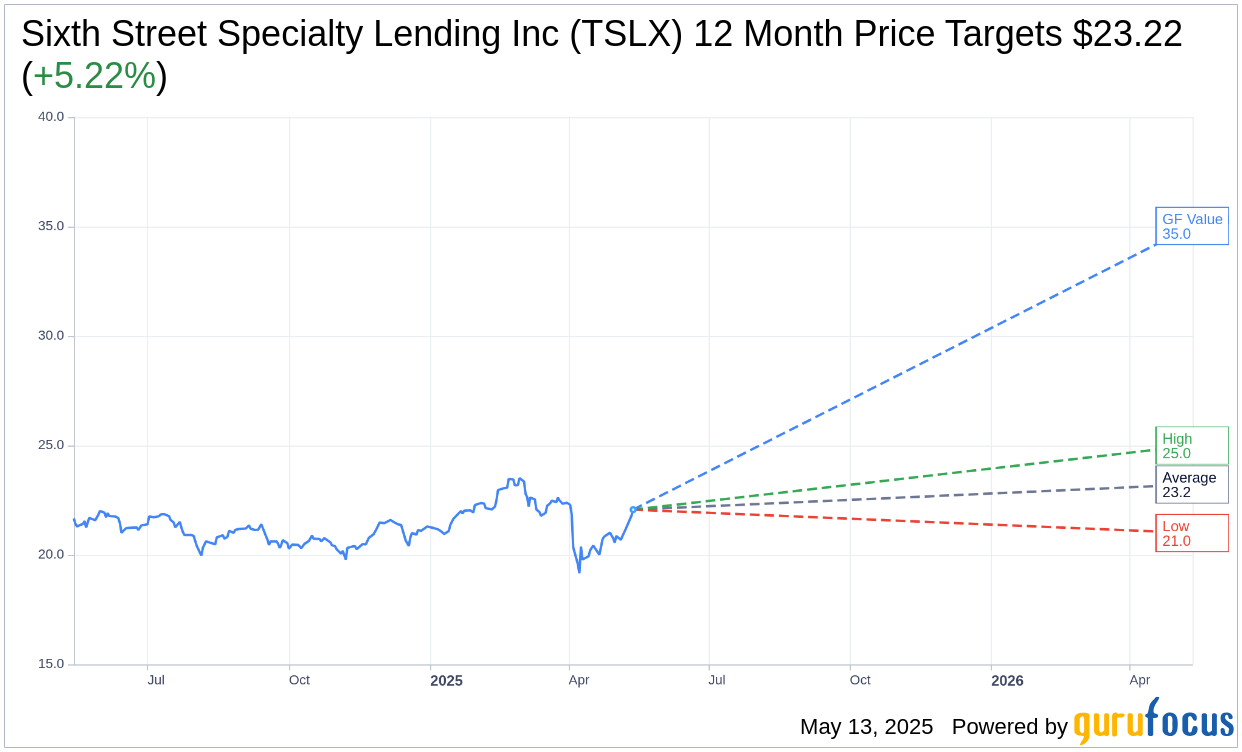B. Riley analyst Sean-Paul Adams has raised his rating on Sixth Street Specialty Lending (TSLX, Financial) from Neutral to Buy, setting a new price target of $23, up from the previous $22. This change follows a shift in coverage of business development companies. Despite generally stable credit trends and supported dividend coverage, the analyst notes that narrower spreads, reduced prepayment activity, and less optimistic origination activity forecasts are slightly impacting short-term earnings outlook. Nonetheless, Riley's Buy rating underscores the company's unique origination strategies, strong equity returns, and improving portfolio metrics.
Wall Street Analysts Forecast

Based on the one-year price targets offered by 9 analysts, the average target price for Sixth Street Specialty Lending Inc (TSLX, Financial) is $23.22 with a high estimate of $25.00 and a low estimate of $21.00. The average target implies an upside of 5.22% from the current price of $22.07. More detailed estimate data can be found on the Sixth Street Specialty Lending Inc (TSLX) Forecast page.
Based on the consensus recommendation from 11 brokerage firms, Sixth Street Specialty Lending Inc's (TSLX, Financial) average brokerage recommendation is currently 2.0, indicating "Outperform" status. The rating scale ranges from 1 to 5, where 1 signifies Strong Buy, and 5 denotes Sell.
Based on GuruFocus estimates, the estimated GF Value for Sixth Street Specialty Lending Inc (TSLX, Financial) in one year is $35.03, suggesting a upside of 58.72% from the current price of $22.07. GF Value is GuruFocus' estimate of the fair value that the stock should be traded at. It is calculated based on the historical multiples the stock has traded at previously, as well as past business growth and the future estimates of the business' performance. More detailed data can be found on the Sixth Street Specialty Lending Inc (TSLX) Summary page.
TSLX Key Business Developments
Release Date: May 01, 2025
- Adjusted Net Investment Income per Share: $0.58
- Adjusted Net Income per Share: $0.36
- Net Investment Income per Share: $0.62
- Net Income per Share: $0.39
- Annualized Return on Equity (Adjusted Net Investment Income): 13.5%
- Annualized Return on Equity (Adjusted Net Income): 8.3%
- Quarterly Earnings Power Estimate: $0.50 per share
- Weighted Average Yield at Amortized Cost: 12.3%
- Net Asset Value per Share: $16.98 (adjusted for supplemental dividend)
- Supplemental Dividend: $0.06 per share
- Base Quarterly Dividend: $0.46 per share
- Total Investments: $3.4 billion
- Total Principal Debt Outstanding: $1.9 billion
- Net Assets: $1.6 billion
- Debt-to-Equity Ratio: 1.15 times
- Weighted Average Interest Rate on Debt: 6.4%
- Total Investment Income: $116.3 million
- Interest and Dividend Income: $98.9 million
- Other Fees: $14 million
- Net Expenses: $60.7 million
- Nonaccruals: 1.2% of portfolio at fair value
For the complete transcript of the earnings call, please refer to the full earnings call transcript.
Positive Points
- Sixth Street Specialty Lending Inc (TSLX, Financial) reported a strong first quarter with adjusted net investment income of $0.58 per share, translating to an annualized return on equity of 13.5%.
- The company declared a base quarterly dividend of $0.46 per share and a supplemental dividend of $0.06 per share, reflecting confidence in its earnings power.
- TSLX's disciplined capital allocation strategy has resulted in portfolio yields that are higher than the sector average, with a weighted average yield at amortized cost of 12.3%.
- The company has significant liquidity and capital capacity, positioning it well to take advantage of attractive investment opportunities in a volatile market environment.
- TSLX maintains a strong credit quality with nonaccruals representing only 1.2% of the portfolio at fair value, and no new investments were added to nonaccrual status in Q1 2025.
Negative Points
- The company experienced a decrease in total investments from $3.5 billion to $3.4 billion due to net repayment activity, indicating a potential challenge in deploying capital.
- TSLX's weighted average yield on debt and income-producing securities decreased slightly quarter-over-quarter, reflecting spread compression and a decline in reference rates.
- The ongoing imbalance in the supply and demand dynamics of the direct lending market, fueled by retail investor-oriented BDCs, has exerted downward pressure on new investment spreads.
- The company faces potential risks from recent tariff announcements, with 2% of its portfolio potentially affected, although the impact is expected to be mild.
- TSLX's cautious approach to capital allocation in a volatile market may limit immediate growth opportunities, as evidenced by the elevated repayment activity and reduced new investment fundings.